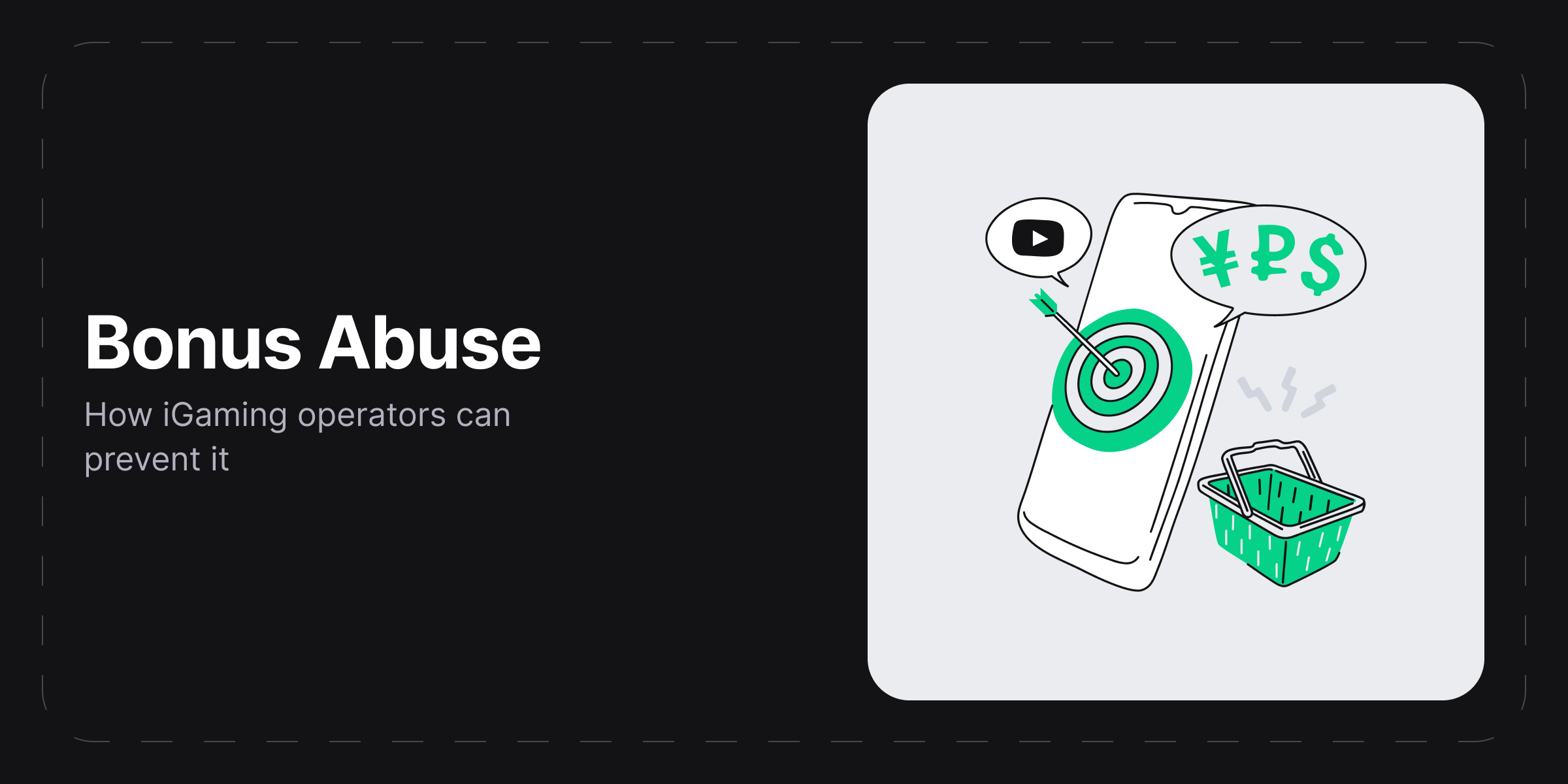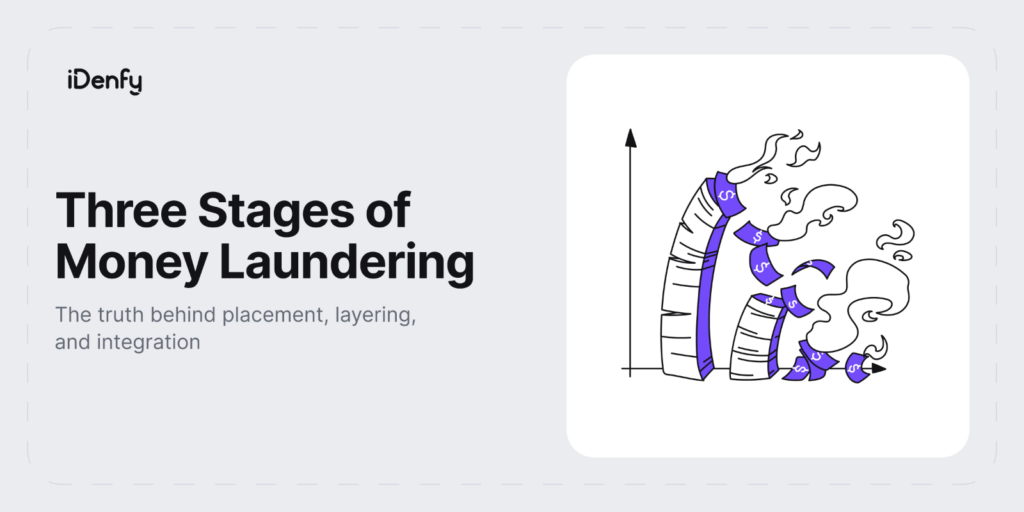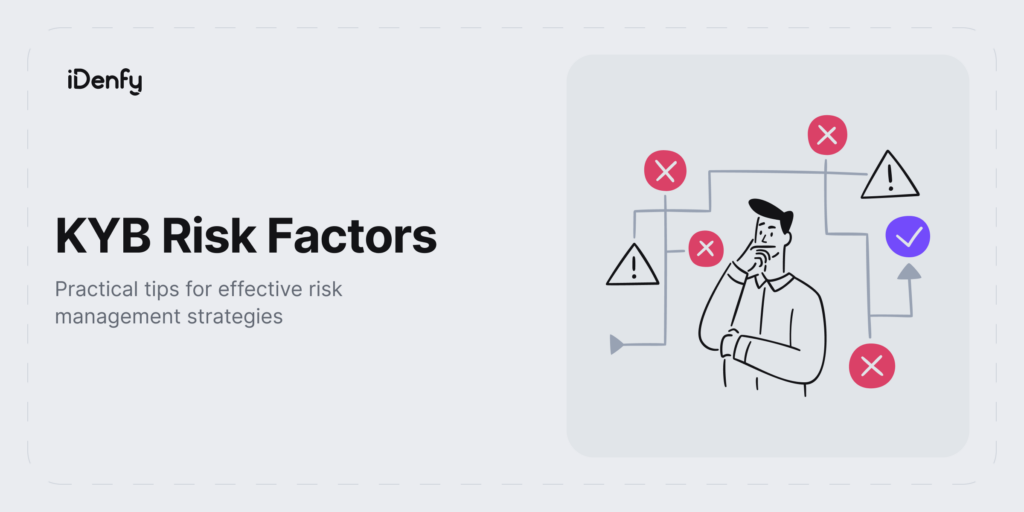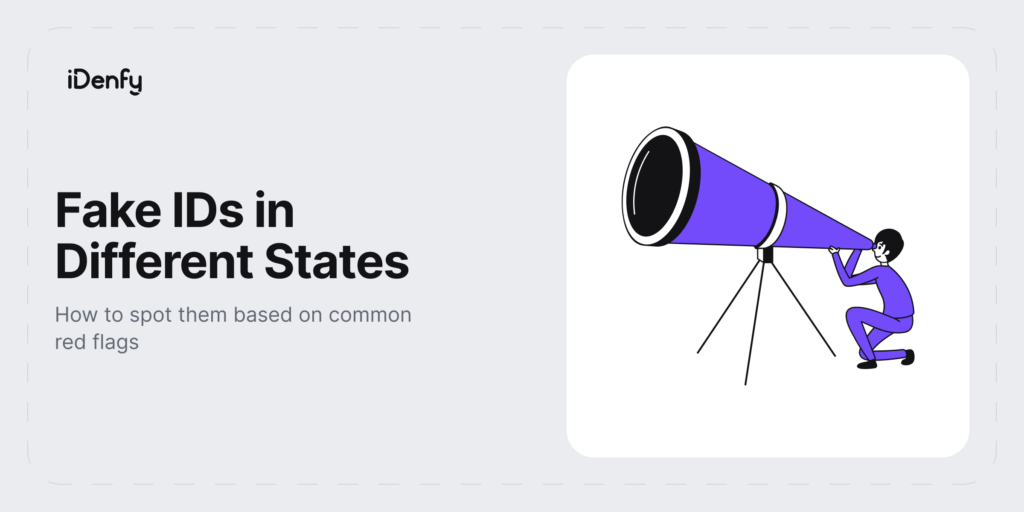Bonus abuse is still an issue for many iGaming operators. Over the years, players have been searching for ways to easily cash out after benefiting from new user opportunities. Numerous discussions on Reddit still exist today, where users discuss how they “scalped” online casinos for years and chose high-stakes games with an “optimal” strategy to guarantee profit.
While critics argue that regulators and some establishments have “smartened up” a bit, users still find ways to exploit free spins, sign-up promotions and other marketed introductory bonuses that are intended only for newly registered users. So, yes, duplicate accounts are also a big challenge for gaming platforms, which also ultimately leads to revenue loss.
So what can iGaming businesses do to attract new users and fewer fraudsters? We look into the best Know Your Customer (KYC) verification practices and review expert insight on whether it is actually possible to stop bonus abuse.
What is Bonus Abuse?
Bonus abuse, also referred to as promo abuse, is a form of fraud that happens when users on iGaming and gambling platforms misuse promotional materials, such as discounts, free spins, or sign-up bonuses, to access new user benefits multiple times by bypassing verification checks. These promotions help platforms encourage gamers to play for free and later bet with their own money, and in an ideal scenario, both the business and the customer should benefit from this system.
The main issue is that some users can exploit such bonuses for money laundering and other malicious activities. While iGaming is most targeted in this sense, fraudsters who abuse bonuses can also affect other industries, such as e-commerce, streaming, or carsharing. To put it simply, any company that uses sign-up bonuses as a marketing tactic is at risk.
The Legality Around Misusing the Bonus System
Bonus abuse fraud is also known as multi-accounting, which goes against fair gaming practices and gaming establishments’ policies. While not all users involved in such bonus abuse have fraudulent intentions, some are highly experienced cheaters who have skills in committing fraud. They know how the system works and how to exploit the platform’s vulnerabilities for their own personal benefit.
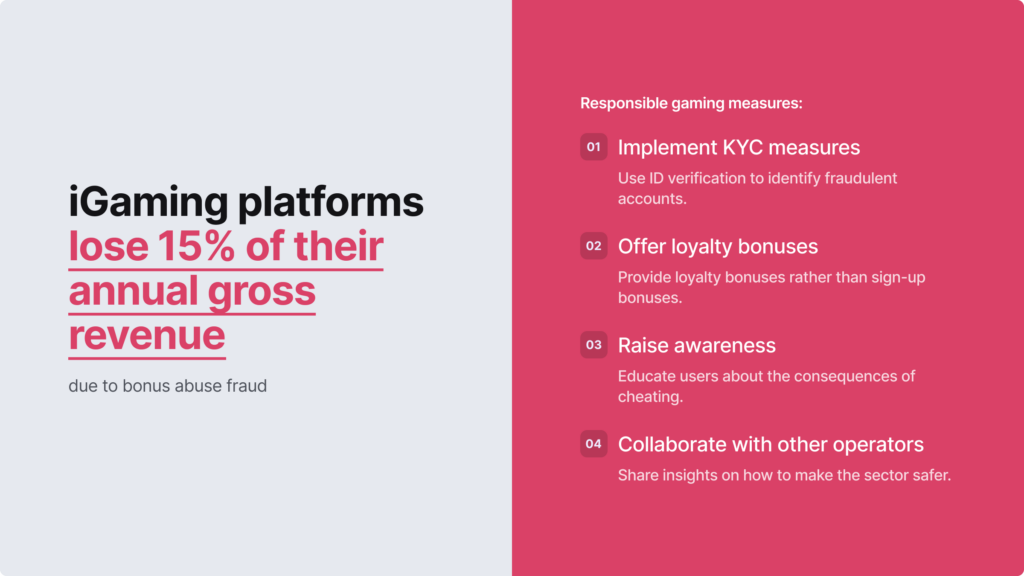
Despite that, bonus abuse fraud is widely known now and is considered to be just a casual going around the system for many regular gamblers. Naturally, more experienced criminals use more advanced tools, such as bots, residential IPs and other methods to create multiple virtual environments for multi-accounting, making it challenging for operators to detect this type of fraud.
What Kind of Bonuses Do iGaming Platforms Offer?
The most popular types of bonuses that operators offer include:
- Free bets
- Free spins
- Cashback
- Reload bonus
- Bonus codes
- No deposit bonus
- Reward program
- Refer-a-friend bonus
For example, when fraudsters sign up for a casino affiliate program, they refer “friends” and earn cost-per-lead commissions. They sometimes also generate fake traffic to earn cost-per-click commissions.
Abusers use these bonus systems to exploit promotions by often working with others and creating multiple accounts, as well as using arbitrage betting to reduce risks while maximizing bonus benefits. For those who get caught playing against the rules, there’s a risk of losing winnings or having the account suspended.
How Does Bonus Abuse Fraud Work in iGaming?
There are three stages in how fraudsters operate in bonus abuse scams:
1. The Fraudster Chooses the Bonus
The bonus abuser has to select an iGaming platform or a casino that offers bonuses that, on their side, are easily exploitable. Such fraudsters aim to exploit the most lucrative bonuses. Ideally, they look for bonuses with minimal requirements and a high chance of winning without needing to deposit real money. For this reason, they often target no-deposit bonuses or free bet promotions that can result in simple cash rewards without getting caught.
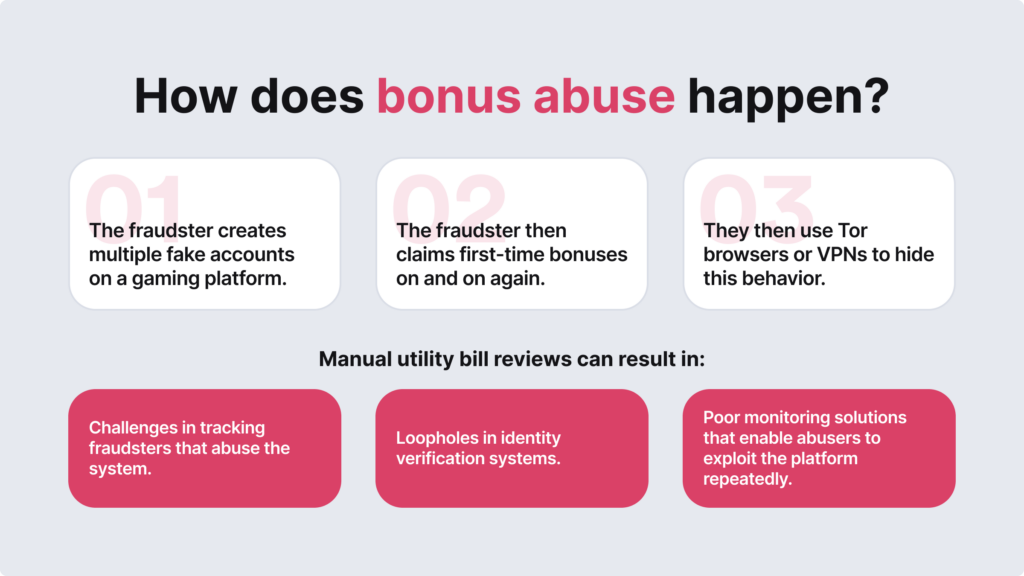
2. The Fraudster Creates Accounts
The fraudster needs to create multiple accounts to claim bonuses over and over again. This helps maximize the chances of accessing these first-time bonuses. However, here, the bonus abuser often uses Tor or VPN services to avoid detection. Fraudsters generally want to hide their activities and withdraw their winnings immediately.
However, they also need to bypass KYC checks, and for that, they use multiple techniques like:
- Fake IDs and forged documents. This includes stolen identities under different account names. Fraudsters use stolen data or family members’ personal details and ID documents.
- Synthetic identities. This tactic involves combining fake and real information to craft a new “Frankenstein” identity that is harder to detect due to some personal details being real. Fraud rings also often choose this method and generate hundreds of such convincing identities.
- Proxies or VPNs. Both options can help fraudsters mask their real identities and IP addresses, sometimes making them appear to be logging in from a different location in order to bypass geographical restrictions imposed by the iGaming platform.
In the bonus abuse process, like in any form of fraud, bad actors use fake or stolen credit card information, disposable emails, and phone numbers and exploit the system, in this case, the promotion, to their advantage. The core issue in the gaming and gambling industry right now is inadequate ID verification measures that fail to detect fraudulent activities, allowing bonus abusers to exploit the system repeatedly.
Related: Fraud Detection — What You Need to Know
3. The Fraudster Uses Some Sort of Bonus Abuse Strategy
This is the last step, where the fraudster actually applies their chosen bonus abuse method. For that, there are various strategies, for example:
- Bonus hunting. A fraudster signs up for multiple gaming sites to collect bonuses using low-risk strategies on purpose. They withdraw their funds before moving to their next catch.
- Chip dumping. This is a popular strategy in online poker where the fraudster intentionally loses chips or their bonus-abused chips to another player, which is often their secondary account. They then cash out and disappear. In general, companies can detect chip dumping by flagging repeated losses and similar suspicious patterns.
- Arbitrage. This is a very popular method in sports betting when the fraudster bets on all possible outcomes to guarantee at least a minimal profit. Such barbers also use automated bots and repeat the same steps across multiple iGaming establishments.
Depending on the system, fraudsters can play normally using the bonus or, worse, dive into more complex organized schemes to maximize their winnings. No matter which bonus abuse strategy the cheater chooses, it still poses a huge threat to a gaming platform’s financial stability, shining a dark light on the whole industry and making it “less fair” for genuine users. As a result, some gaming platforms now have stricter rules and less generous bonuses for their players.
What are the Signs of Bonus Abuse on a Player?
Let’s say a user on a gaming platform created multiple accounts. Not only that, but you also discovered that they changed their personal details, for example, their address information, and made other minor changes multiple times. Then, your data shows that the same person submitted over a hundred applications to more than fifteen gaming establishments, using different contact information, such as name or date of birth.
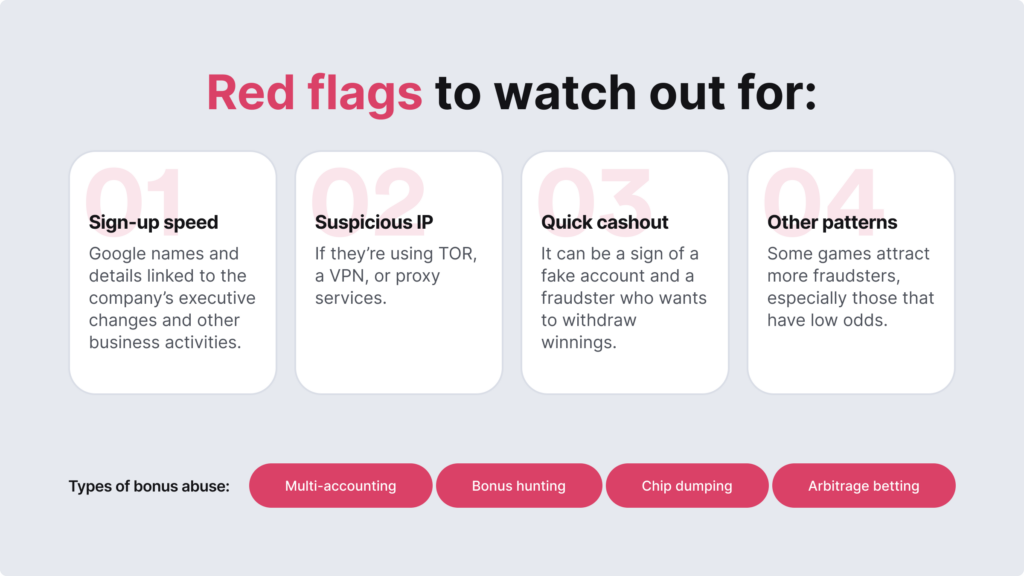
Some key warning signs that can link the user to bonus abuse fraud are:
- Repeated history of rapid sign-ups.
- Activity only in low-odds games.
- Blacklisted proxies or TOR browsers.
- Quick cashouts or chip dumps after registration.
- Repeated visits with similar software combinations.
These are all red flags that show that not only is the user breaching the policy but also conducting multiple fraudulent activities. That’s why some platforms integrate additional address verification checks or, for example, use risk assessment tools to monitor user behavior changes, which can indicate fraud.
What are the Consequences of Bonus Abuse?
For large-scale iGaming businesses, small losses from bonus abuse stack up, which makes it thousands of dollars lost to scammers who don’t ever become legitimate, long-time players.
Although it might seem like an innocent crime, it can actually lead to major financial losses and make loyal customers feel underappreciated, especially if the bonuses are minimized after a while. Sometimes, bonus abuse can lead to price increases, making it hard to attract new users. For this reason, proper bonus systems are a good marketing tactic that helps not only attract but also retain existing customers.
Can Identity Verification Really Help the iGaming Industry?
The simple answer is yes, KYC checks, or identity verification measures, are the primary defense for iGaming platforms to protect their users and only accept legitimate players who 1) aren’t planning on abusing the bonus system and 2) are of legal age. While identity fraud might seem a thing of the past, it’s still a big issue. Fraudulent activities like bonus abuse can make it difficult to detect legitimate new customers and fraudsters.
In practice, an identity verification during the account creation process in iGaming can look like this:
- Checking the user’s personal information, such as their name, address, and date of birth, to detect problem gamblers, repeated bonus abuse criminals, and other fraudsters who use stolen data to bypass verification systems.
- Combining document and selfie checks that check both the player’s ID and biometric data. If customized not to add unnecessary friction, this method is more effective because it matches and approves key user details before sign-up or cash-out, making it difficult for fraudsters to operate on a large scale due to the challenge of matching biometrics.
Of course, standard procedures like monitoring user activity and enforcing stricter terms and conditions that go along with KYC/AML compliance are vital. Unlike ID verification during the onboarding process, monitoring identifies bonus abuse after it occurs. This process helps detect other fraudulent attempts conducted by rings that often persist until caught. This way, iGaming platforms can minimize bonus abuse and detect suspicious cash-out and sign-up patterns in real-time.
Contact us for additional compliance insights and hands-on experience with ID and age verification measures tailored for the iGaming industry.
